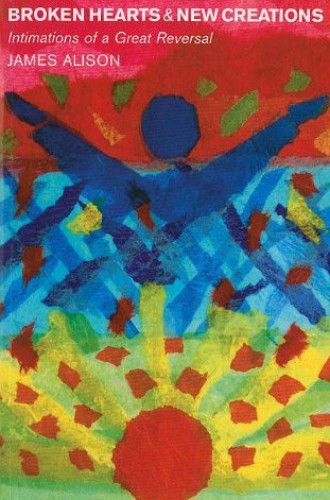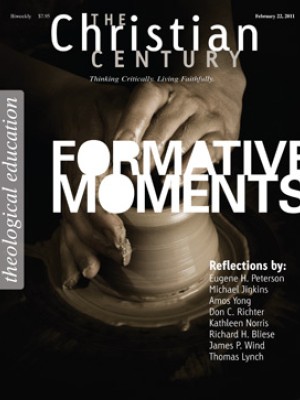Broken Hearts and New Creations, by James Alison
A native of England, James Alison converted to Catholicism when he was 18. He studied with the Dominicans at Oxford, received his doctorate in systematic theology from the Jesuit theology faculty in Belo Horizonte, Brazil, and has lived and worked in several Latin American countries and in the United States. Most of the 16 essays in this, his seventh, book are based on presentations he gave from 2006 to 2009.
Just as Aristotle provided the philosophical foundation for the theology of Thomas Aquinas, so the contemporary French thinker René Girard provides the anthropology that is the basis for Alison's systematic theology. Developing the theological implications of Girard's thought has been Alison's explicit project throughout his career.
Read our latest issue or browse back issues.
Key to Girard's thought are two ideas: the social construction of the self through the imitation of others (mimetic theory) and the scapegoat mechanism—"the creation of peace out of frenzy by the random designation and expulsion of one against whom all can unite." Thus the rules for survival in the group are reciprocity (do to others as they do to you) and revenge. But in the death and resurrection of Jesus, God sides with the victim and thus replaces reciprocity with gratuity and revenge with forgiveness. Thus we are enabled "to live as if death were no more." Humans can now realize that we are fundamentally the same and that there is no need to exclude anyone.
This rather abstruse bit of amazing good news is the most prominent and consistent theme of Broken Hearts and New Creations, as it is the center of Alison's unorthodox orthodoxy. But other themes also weave their way through the fabric of the book.
Girard is a reader and interpreter of texts, and Alison has learned from Girard a freedom and creativity in biblical hermeneutics. He consistently sees the Hebrew scriptures and the apostolic witness "nestling in each other in quite unexpected ways." It is unusual to find a systematic theologian so well versed in biblical languages, so attentive to scripture and so creative and insightful in his interpretations—which invariably elucidate his central theme.
In an essay on discipleship, Alison explains that he writes from limbo, from two "non-places." He is quite aware that Christian faith and theology are essentially communal and ecclesial, but he is a freelance theologian and a priest with no juridical standing. This is because he has come to believe that the current characterization of gay people by church authorities is not true, and he has been ostracized by church officials and on account of his own conscience. One does not have to be a Girardian to see the scapegoat mechanism at work here.
Alison thinks it is inevitable that the church will recognize that its position on this "third-order teaching" is untrue and untenable. In the meantime he is utterly convinced of the central truths of the Catholic faith, and he respects church authority under the guidance of the Holy Spirit. He counsels the beleaguered gay Catholic community—estranged by the church for being gay and suspect to fellow gays for being Catholic—to be gentle and forgiving of church authorities as they flail about in the end game of gay acceptance.
I have two critical comments on Alison. First, because I am a moral theologian, I was looking for Alison to draw out the moral implications of living "as if death were no more." Instead his theology remains abstract, as if the central insight into the forgiveness and freedom wrought by the Christ event is enough.
Second, I was often left confused by Alison's indirect and complex style. Reviewers of his earlier books praise his "effervescence." They find him highly readable and provocative; one says that he is "among the nimblest and most imaginative of today's theologians." I agree that Alison is a brilliant and profound theologian who is engaged in a very worthwhile project. I do not, however, find him clear and accessible. It is quite possible that his work is simply over my head.
Here is an example. In an essay on the difference Girard makes to how we read the Bible, Alison writes that "liturgy is prior to text" and that "many of the texts of the Hebrew Scriptures were born for liturgical purposes."
Once this liturgical priority is perceived, then many repetitions, slightly different versions of the same story, word play across long chunks of text and allusions within stories, all start to make sense: we are not dealing with texts which were written as "completed books" for people to buy, take home and read, as we might do with the latest Grisham or Scarpetta. What we have instead is, often enough, something much more like a mixture between preacher's manuals and orchestral scores: the former in the sense that what is being provided is a series of paths, guides and stories by which a master expositor is to make alive the event that is being celebrated, the feast that is being rehearsed; and the latter in the sense that each performance is unique, that there is real skill, accomplishment, practice and judgment required in rendering the silent annotations into the audible form that is their realisation, and that the meaning of the score is only to be sensed in the performance.
This is typical Alison—wonderful analogies wrapped in a complex sentence that one needs a GPS to get through. His style is not my cup of tea, but it may be yours.
Alison's marriage of his systematic theology to Girard's anthropology is a fruitful commitment that yields deep insight into the meaning of the death and resurrection of Jesus, into biblical hermeneutics and into the estrangement of gays from the church.






